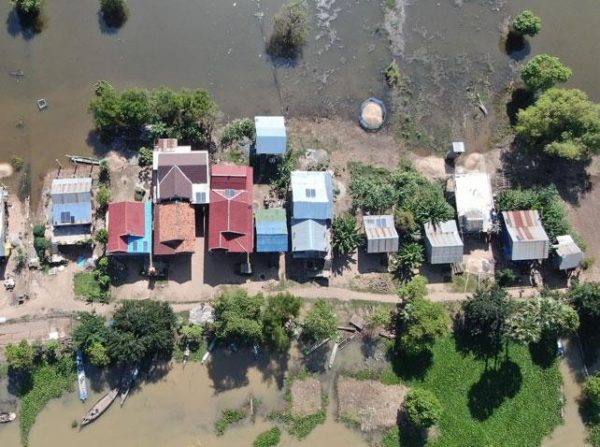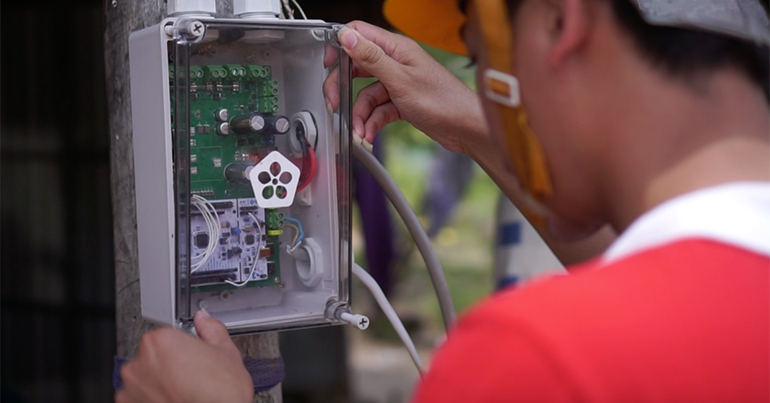Australian-founded technology company Okra Solar’s mission to provide reliable renewable energy solutions to people living off-grid in developing nations has received a major boost with the start-up raising $3 million to ramp up the distribution of its IoT-enabled mesh-grids.
Launched in 2016, Okra has developed an Internet-of-Things (IoT) and artificial intelligence-enabled mesh-grid which shares power through an interconnected network of homes. The plug-and-play solar home system includes a solar panel, battery and a smart device. A cloud-based system monitors usage and required maintenance, while allowing for remote control.
At present, the company is focused on the Philippines, Haiti, Cambodia and Nigeria which is home to the world’s largest unelectrified population, totalling approximately 80 million people.
The funding was led by Singapore-based technology fund and advisory group SDGx, Schneider Electric Energy Access, Autodesk Foundation, Explorer Investments and Didendum. Okra is also opening its Series A round, with the aim of raising a further $6 million to help finance its expansion into other countries.
SDGx partner and chief impact officer Zarmeen Parvi said Okra Solar ticked all the boxes for the technology fund.
“It’s rare to see an Australian company scale so successfully into many international markets so quickly,” he said. “Okra Solar brings an impact multiplier that intersects and positively contributes towards energy access. This is a great example of how an impact multiplier also drives scale with commercial outcomes, while solving the world’s GHG emissions and climate change problems.”
Okra co-founder and chief executive officer Afnan Hannan said the funding will be used to scale up commercial operations and product development in Nigeria and Haiti as the company looks to expand.
“It feels great to lock in this funding so that we can accelerate our growth,” he said. “We’re excited to continue charging towards providing energy access for the 770 million people living in off-grid communities.
“Our mesh-grids leverage IoT and automation to make last-mile electrification affordable and sustainable – even for the most remote villages on the planet. Our innovation has spurred global demand from utility companies.”

Image: Okra Solar
Hannan said in contrast to centralized microgrids, Okra’s mesh-grid technology allows for all assets – from solar panels to batteries and inverters – to be installed at individual households.
This design ensures the majority of energy is generated and consumed at the same place but additionally, neighbouring households can also interconnect and form power-sharing clusters, where smart algorithms redistribute excess power.
Grid operators use Okra’s software to monitor, maintain, service and receive payment from end-users via the cloud.
The funding announcement comes after Okra recently signed a memorandum of understanding with African investment firm SAO Capital to scale up their existing projects to an additional 290,000 homes over the next three years.
Okra said if the partnership achieves its objectives, it will be the largest project globally to energise off-grid households with decentralised grids.
This content is protected by copyright and may not be reused. If you want to cooperate with us and would like to reuse some of our content, please contact: editors@pv-magazine.com.









6 comments
By submitting this form you agree to pv magazine using your data for the purposes of publishing your comment.
Your personal data will only be disclosed or otherwise transmitted to third parties for the purposes of spam filtering or if this is necessary for technical maintenance of the website. Any other transfer to third parties will not take place unless this is justified on the basis of applicable data protection regulations or if pv magazine is legally obliged to do so.
You may revoke this consent at any time with effect for the future, in which case your personal data will be deleted immediately. Otherwise, your data will be deleted if pv magazine has processed your request or the purpose of data storage is fulfilled.
Further information on data privacy can be found in our Data Protection Policy.